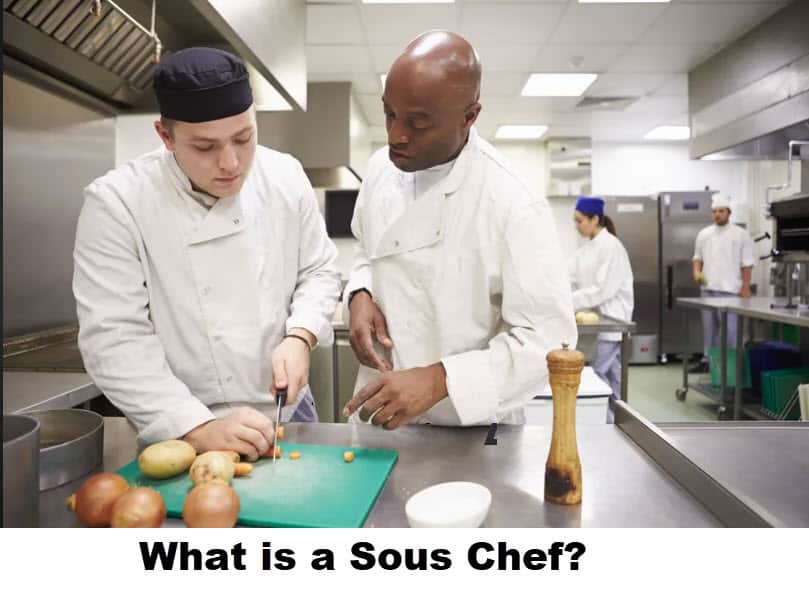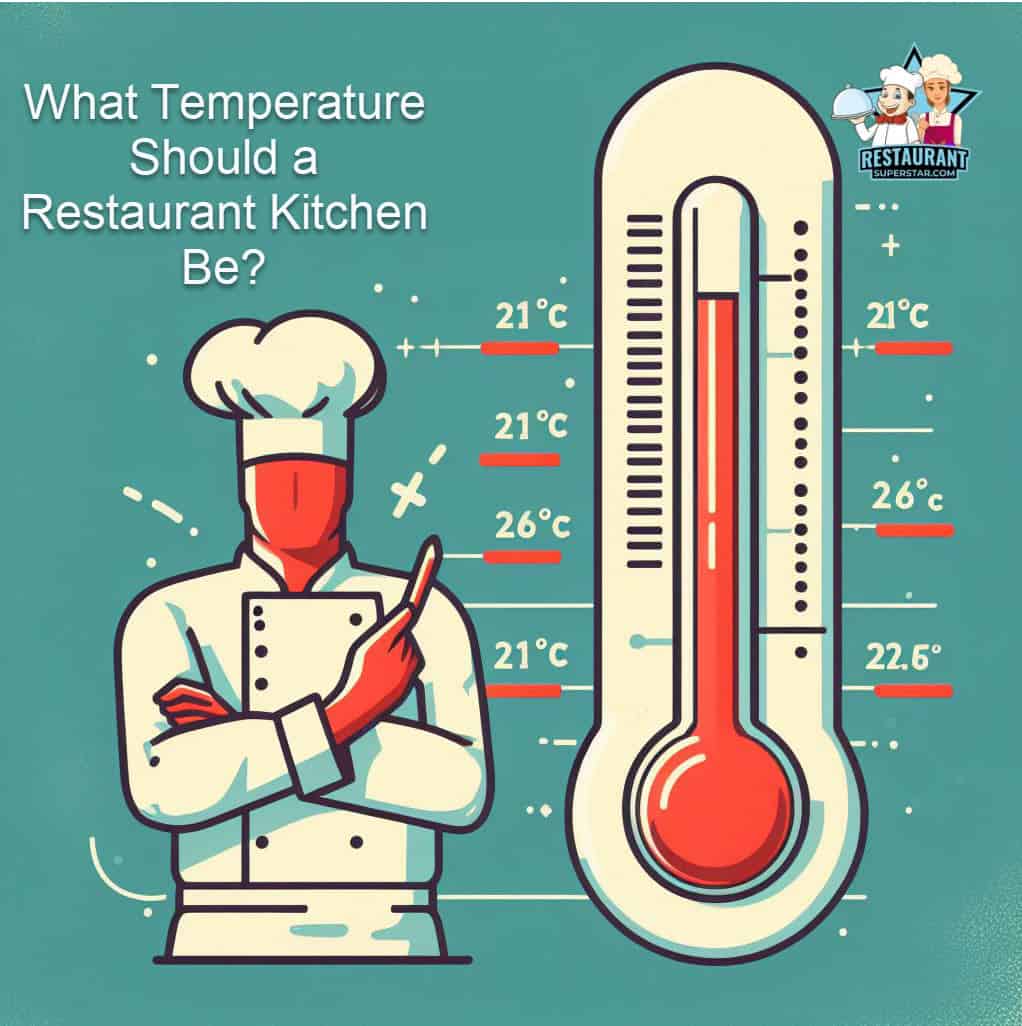What Is a Sous Chef? (15+ Important Facts)

Most readers will have encountered the term “sous chef” in one of our many restaurant-related articles. Or you may remember a time when a dinner guest jokingly volunteered to be your sous chef as you were preparing a meal in your kitchen.
You probably didn’t understand the concept, so you’ll grin. However, what is a sous chef? Where does working in the kitchen as a sous chef rank on the hierarchy scale? You’ve come to the right place; you’ll find everything you need here.
What is a sous chef? A “sous chef” is a person who works in the restaurant and answers to the “directeur de cuisine” or “executive chef.” They worked hard and got promoted to sous chef at their restaurant or another one. Before becoming a sous chef, a cook should have mastered the restaurant’s dishes.
A sous chef might not be necessary for a small eatery, in a Restaurant where the Chef is presumably also the proprietor, working round the clock as there aren’t enough people working at once for him to have a sous chef. In a large restaurant where everything is prepared in-house, including the stocks, bread, salad dressing, and ice cream, many sous chefs may cover all shifts on all days they are open and give staff a day off.
What Does Sous Chef Mean?
In the kitchen, a sous chef is the head cook’s assistant, and executive chefs or chef de cuisine are both examples of the chief. Sous chefs are the most highly respected kitchen staff members since they represent the head chef.
Duties and functions
A sous chef manages the seamless operation of the kitchen daily. This entails putting in orders for the restaurant’s supplies, keeping the kitchen tidy and organized, directing the work of each cook, and instructing them in preparing new dishes and cooking methods. They frequently advise the Chef and provide them with updates on the work of the chefs while maintaining order and discipline in the kitchen.
The sous chef has obligations to the head chef, the restaurant, and themselves. They must constantly improve their skills to take over as executive chefs when the Chef is absent or moves on to another role.
When a sous chef reaches administrative chef proficiency and assurance, they have two options: either they stay in their current position and serve as a true leader in the kitchen, or they pursue their goal of opening their restaurant and re-start the cycle by mentoring the following group of sous chefs.
Which Skills Should a Sous Chef Have?
A cook must be able to prepare every dish on the menu, step in and take over for anyone cooking on the line in an emergency, and take the lead role if the chef de cuisine is not present in the kitchen to become a sous chef.
They should be extremely organized, have expertise in operating every station in the kitchen, and be knowledgeable about ordering and pricing analysis for the whole menu.
Because they typically train new kitchen employees, a sous chef should also be an effective instructor. They are the last to view the food before bringing it to the dining room.
They regularly expedite during service (ask each Chef when to begin preparing the food so that all the orders for a single table come up simultaneously). When it comes to ensuring quality, they are experts.
What are the levels of chefs?
Auguste Escoffier established a hierarchical framework based on the chef grades in the kitchen. The titles of the jobs denote a chain of command with branches based on the French military system.
Executive Chef:
The chief Chef, who may be in charge of one or several eateries, often has a financial interest in the enterprise.
Chef de Cuisine:
The “chef de cuisine” (sometimes “chief chef”) of a restaurant or hotel oversees all culinary activities. The terms “executive chef” and “chef patron” are used interchangeably to describe a chef who owns and manages a chain of restaurants and their respective kitchen staff.
Sous Chef:
A sous-chef, or just a sous-chef, is the person in charge of the kitchen after the head chef. This is a highly respected and prestigious job. This means that the sous chef is in charge of many different kitchen tasks and has a good chance of becoming the head chef in the future.
Chef de partie:
Chef de partie, station chef, or line cook refers to the chef overseeing a certain kitchen section. Each Chef de partie may have multiple chefs or assistants in large kitchens. However, the Chef de partie is typically the only employee in the kitchen.
Commis chef:
As a junior member of the culinary crew, Commis Chefs work under the direction of a Head Chef or Chef de Partie.
Aboyeur
The sous-chef de partie may also serve as the aboyeur, who accepts orders from the dining room and delivers them to the various stations. The communal (staff cook) makes the restaurant personnel’s supper.
What Is a Sous Chef Salary?
In the United States, a sous chef makes an average pay of $45,000 annually. The average can range from $26,000 annually in Wyoming to $60,000 annually in affluent urban regions like Seattle and New York City, depending on the region.
What Makes a Good Sous Chef?
The sous chef needs to be quick on their feet, flexible, and composed under pressure. They frequently make last-minute adjustments when specific supplies or people are late for a service. They serve as the team’s liaison with the head chef, crucial in every culinary setting.
A particular mentality and a variety of talents are needed for this position. The skills you might need to build are listed below.
Cooking Skills
It does seem very clear, yeah? However, a sous chef must possess outstanding culinary skills to be efficient. They must be ready to join any line for any cause, such as when a cook is missing from the line or meal service is at its busiest.
A sous chef may be able to prepare several delicious dishes, from salads to intricate entrees, by quickly switching between different cooking methods.
Leadership and Communication Skills
Some abilities are interconnected. Although the executive Chef is officially in control of the kitchen, the sous chef handles much of the day-to-day administration.
The role of the ideal sous chef is to help the executive chef carry out his vision for the meal by communicating with, supervising, and assisting the kitchen staff.
The sous chef must exude the assurance and authority necessary to lead personnel in a frequently hectic, noisy, and stressful setting. Keeping the entire team focused on a single objective is a difficult task.
In addition to executing their duties as a cook on the line, it requires effective communication and the capacity to inspire and direct everyone. A great sous chef can balance these obligations even when the staff feels overworked and overwhelmed.
Organizational Skills
Customarily, being a sous chef is the last stage before becoming an executive chef. The sous chef might learn firsthand what it takes to become an executive chef in this role.
By doing this, they will be more qualified to fill the position of Chef in a different restaurant.
Suppose the incumbent executive Chef leaves or retires. In that case, sous chefs are frequently allowed to advance to executive chef status within the same restaurant. Working as a sous chef gave me practical experience that could be useful in the future.
The sous chef needs to be quick on their feet, flexible, and composed under pressure. They frequently make last-minute adjustments when specific supplies or people are late for a service. They serve as the team’s liaison with the head chef, crucial in every culinary setting.
Reliability
An effective working relationship between the executive Chef and the sous chef is based on this. For a kitchen to function successfully, the head chef must believe that their “right hand” is capable, reliable, and obedient.
As a sous chef, your success depends on your ability to integrate into a new kitchen and quickly prove your reliability to your colleagues. A sous chef might be distinguished by always being on time, working late, and completing tasks early.
As a sous chef, you can be required to work up to 12 hours every day, and the task might not seem particularly rewarding. But for many people, the amount of commitment to the trade is worthwhile. Having your staff respect you and your head chef trust you is a great feeling, as is being a part of a thriving restaurant.
It’s gratifying to be a part of a thriving restaurant where you’re respected by your coworkers and have the trust of the Executive Chef.
When the executive Chef or the restaurant succeeds, the sous chef may achieve the same. They may also rise to the brigade’s leadership position more quickly should the executive Chef decide to resign.
How can you become a sous chef?
You can begin by taking any open position in a kitchen and advancing to the sous chef position. Based on the restaurant, this may entail being a dishwasher, prep cook, line cook, or performing other jobs. Nevertheless, dependent on the restaurant’s turnover rate and the executive Chef’s inclination to promote from within, this could take a long time.
Rather, obtaining a degree in the culinary arts can frequently help you achieve your objectives more rapidly.
As a result of your expanded training and understanding, you’ll probably be able to start your restaurant career from a higher initial position. Doing this allows you to advance much more quickly than if you had to start from the beginning.
Embarking on the Journey to Sous Chef
Given the degree of responsibility and continual personal development required of a sous chef, you can undoubtedly profit from continued love for the profession. A formal culinary degree may be necessary for many sous chef positions.
If you have the mindset and motivation to pursue it, becoming a successful sous chef is a rewarding vocation that requires commitment and endurance.
Additionally, the sous chef is frequently next in line for the head position in the brigade de cuisine, and many sous chefs eventually advance to executive chefs.
When considering a career in the culinary arts, what place does that of a sous chef hold?
Customarily, being a sous chef is the last stage before becoming an executive chef. The sous chef might learn firsthand what it takes to become an executive chef in this role. By doing this, they will be more qualified to fill the position of Chef in a different restaurant.
Suppose the incumbent executive Chef leaves or retires. In that case, sous chefs are frequently allowed to advance to executive chef status within the same restaurant. Working as a sous chef gave me practical experience that could be useful in the future.
FAQS – What Is a Sous Chef?
What does the sous chef do?
Executive chefs are supported by and represented by sous chefs when absent. The sous chef frequently supervises the crew and trains new employees. They should have the mental agility to solve problems, make sound judgments under pressure, and develop fresh ideas for the restaurant.
They also need to keep track of stock, place orders for it, monitor the effectiveness of sanitation procedures, and ensure the kitchen crew has all the tools and supplies required to deliver a final product smoothly.
In addition, a Sous Chef is an authority in keeping the kitchen running smoothly. They provide the Head Chef with everything they need to make food for customers, including the funds to purchase supplies, the organization to keep an accurate stock list, and the vigilance to keep the whole kitchen spotless.
What is the difference between a chef and a sous chef?
Chefs are responsible for managing the kitchen, which includes creating the menu, managing staff, paying the bills, and keeping track of the cost of the food. The Executive Chef’s right-hand man is the sous chef, also known as the assistant Chef.
The function often overlaps with that of the head chef. However, the sous chef tends to be more hands-on and actively manages the kitchen daily. To fill in for the head chef in their absence, the sous chef may also be asked to perform the duties of the Chef de partie.
The Chef, an executive or head chef, is at the top of the kitchen hierarchy. The managerial aspect of running the restaurant is under the control of the chefs. Second in command is a sous chef or second Chef, who is frequently in charge of making the cuisine.
Does a sous chef cook?
Sous chefs control a kitchen, second only to the head chef. They are accountable for ensuring that freshly prepared meals are served to customers. The tasks you do as a sous chef will always surprise you. You may expect a lot of responsibility in the sous chef role, even though the job involves cooking and meal preparation. Sous chefs often act as head cooks when their superior is not around.
Frequently, the sous chef is in charge of managing all of the lower-level personnel before, during, and after food service. In various situations, disciplinary action against staff who don’t meet performance standards is one option.
The sous chef is normally in charge of handling any problems in the kitchen so that the executive Chef doesn’t have to. The sous chef must handle any additional tasks that the executive chef requests to keep the restaurant operating as efficiently as possible.
Is being a sous chef hard
Often, a sous chef must work late into the night in a hot, sometimes crowded kitchen. Long shifts and constant pressure to produce high-quality dishes are two of the main challenges of a career as a sous chef.
A sous chef’s education and experience must mirror that of the head chef, with three to six months spent learning every facet of food preparation and safety. Substitute cooks are often sought after by businesses, although employers often want candidates with two to five years of experience.
Depending on the concentration of the head chef, a sous chef may also need to be engaged in commercial and administrative tasks. To put it another way, the sous chef will fill in whenever necessary, whether it be covering for a sick cook or doing the head chef’s duties while they are abroad. The sous chef typically works from opening to closing every day, much like the head chef.
What are the requirements for a position as a sous chef?
- A high school diploma or GED is necessary; an associate degree in culinary arts or formal culinary training is desirable.
- Cooking experience in a fine dining setting for at least two to five years is required; experience in a culinary leadership position is desired.
- Clear communication skills with management, kitchen and dining room staff, and visitors.
- Food Safety Training Certification
- Ability to labor long hours in heated environments while bending, standing, and stooping for extended amounts of time
- You must have previous expertise in mathematical operations and calculating numbers and amounts to satisfy the firm’s needs.
Is a sous chef a manager?
They are the Executive Chef’s second in command. “under chef” is the direct translation of “sous chef.” Although the duties of the Head Chef and Sous Chef frequently overlap, the Sous Chef typically has more operational responsibility.
To duplicate everything exactly as the head chef intended, a sous chef frequently serves as the line manager and supervisor in the kitchen.
What do sous chefs wear?
The typical chef’s uniform consists of a chef coat, chef trousers, a hat, a neckerchief, an apron, slip-resistant shoes, and, occasionally, a hand towel.
A chef’s uniform serves many more functions than only that of a uniform. When it comes to typical kitchen dangers, every piece of your ensemble serves a vital role.
Chefs often wear a jacket and pants designed specifically for them, as well as a hat, neckerchief, apron, sturdy shoes with good traction, and even a hand towel on occasion. There is a purpose to having all the parts of the chef uniform, even if you don’t always use them.
Conclusion
Thank you for reading to the conclusion. To wrap up, you’ve known what a sous chef is; as a quick reminder, they help a chef during the cooking process; they are like the right hand of a chef, got it? We’ve also seen how excellent it can be as a career. It can be busy and quick-paced in the professional kitchen.
People that appreciate a lot of variation in their jobs and thrive under pressure will prosper in this setting. There are several prospects for promotion for sous chefs who can handle the demands of the position.
Career opportunities for sous chefs are diverse and fascinating. Becoming a sous chef is an excellent choice if you’re interested in pursuing one of the numerous opportunities in the dynamic professional catering sector.
Jeff Smith is a Restaurant Consultant with over 20 years of hospitality experience ranging from server to owner and general manager. He focuses on Restaurant POS technology as well as restaurant marketing. Make sure to check out our world famous restaurant resources page for a comprehensive offering of hand picked resources and tools to help your business. You can also check out some of our other restaurant business articles.



